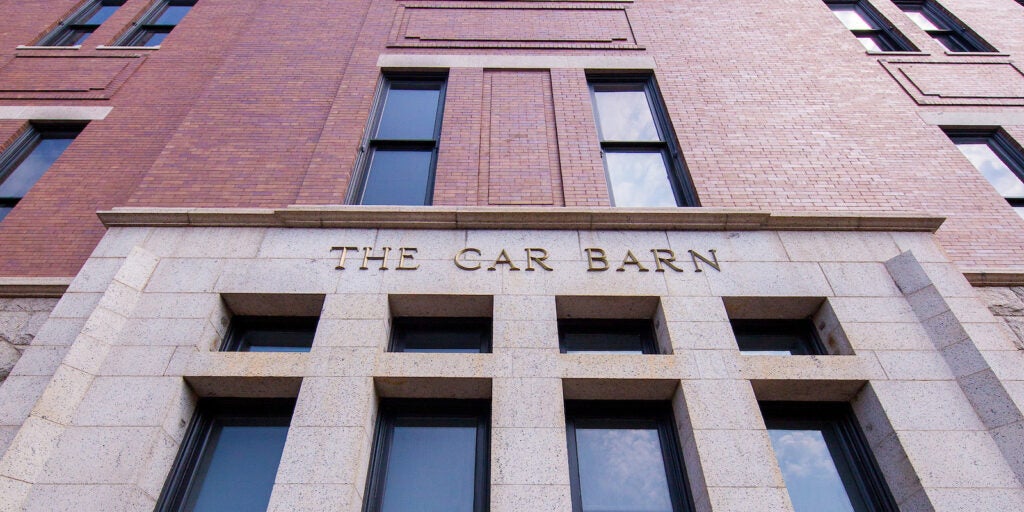Introducing the Career Planning Process for Graduate Students

The Car Barn building — a popular spot for graduate student classes, offices, study spaces, and also the home of the Graduate Career Center.
Graduate school can feel like a full-time job, and jumpstarting your career can feel like an overwhelming task amidst the assignments, projects, and exams. Whether you’re in the early stages of your master’s program or wrapping up your doctoral dissertation, it’s not uncommon to feel uncertain about your next steps. You might find yourself asking:
- What are my career options outside of academia?
- How do I figure out what fits me best?
- What’s even out there for me?
- Am I doing enough to prepare for my future?
If these questions sound familiar, you’re not alone. Career planning doesn’t need to be overwhelming. In fact, when approached as a step-by-step process, it can become more manageable and less daunting.
The Career Planning Process: A Roadmap for Graduate Students
At the Graduate Career Center, we use a five-step model to guide graduate students through a holistic and intentional career journey. The Career Planning Process is a general framework that we use to provide students with actionable steps as they begin working on their job search. It’s broken down into five stages:
- Exploration – Review the resources you have at hand and opening your mind to the opportunities before you. This stage serves as a time to orient yourself toward a career mindset.
- Reflection – Assess your wants and needs in relation to your career. Take time to reflect on your experiences and skills that will set you up for success in a job search.
- Research – Based on your exploration and reflection, spend time finding targeted resources to which you want to allocate your time and energy into. Look into the specifics of a particular industry, field, or occupation. Find real, open positions.
- Preparation – Begin crafting relevant application materials and intentionally reviewing, revising, and practicing for interviews.
- Execution – Actively send out applications to your target positions, complete interviews, and navigate through negotiation stages.
Each stage builds upon the next, but it’s also common to move back and forth between them as your experiences evolve.
Why Use the Career Planning Process?
You may be used to making decisions based on academic milestones—finishing coursework, completing a thesis, defending your dissertation. But careers, especially for graduate degree holders, don’t often follow a straight path. The Career Planning Process gives structure to what can otherwise feel like a messy, unclear journey.
By intentionally walking through this process, you can:
- Discover career options aligned with your skills and values
- Feel more in control of your professional development
- Avoid defaulting into roles that don’t energize or fulfill you
- Learn to articulate your experiences and goals with clarity and confidence
- Prepare effectively for applications, interviews, and transitions
Whether you’re aiming for academia, industry, nonprofits, government, or something else entirely, the process adapts to fit you.
It’s Not About Having It All Figured Out
One of the biggest myths about career planning is that you need to know exactly what you want before seeking guidance. The truth is, uncertainty is a great place to begin. Many graduate students come to the career center unsure of their path—and that’s perfectly okay.
In fact, the Career Planning Process is designed with that in mind. You might begin with a vague sense of wanting to “do something outside academia” or “find meaningful work” but feel unsure how to define or pursue that. Each step of the process offers tools and strategies to help you:
- Broaden your understanding of what’s possible
- Understand yourself more deeply
- Learn from people and resources around you
- Build practical skills and confidence
- Take informed, intentional action
Career planning becomes less about finding the answer and more about making informed, values-driven decisions at each stage of your journey.
A Process That Meets You Where You Are
You don’t need to be at the “right” step to benefit from the process. Maybe you’ve already done some self-reflection but need help translating your skills to different industries. Maybe you’ve been applying for jobs but feel lost about what direction to take next. Or maybe you’re just starting to wonder, What do I even want from my career?
Wherever you are, this process can help:
- If you’re just getting started: It can help you explore and build awareness.
- If you have some ideas: It can help you research and clarify next steps.
- If you’re ready to take action: It can help you prepare compelling materials and connect with opportunities.
And most importantly, it reminds you that career growth doesn’t stop at graduation—it’s a lifelong journey.
What’s Next?
In the coming weeks, we’ll publish a series of blog posts that explore each of the five stages in depth, offering practical tips, questions to consider, and resources to support your next steps. Here’s a preview:
- Exploration – Get curious about the range of career options available to you.
- Reflection – Understand your values, strengths, and goals.
- Research – Dive into specific industries, roles, and paths that align with your interests.
- Preparation – Craft your resume, practice interviews, and strengthen your skillset.
- Execution – Take action, apply to opportunities, and follow up intentionally.
Whether you’re at the beginning, middle, or crossroads of your graduate experience, we hope this series empowers you to move forward with confidence and clarity.
Read More: Phase 1 – Exploration
Dive into the specifics of the first phase of the career planning process in our blog post series.